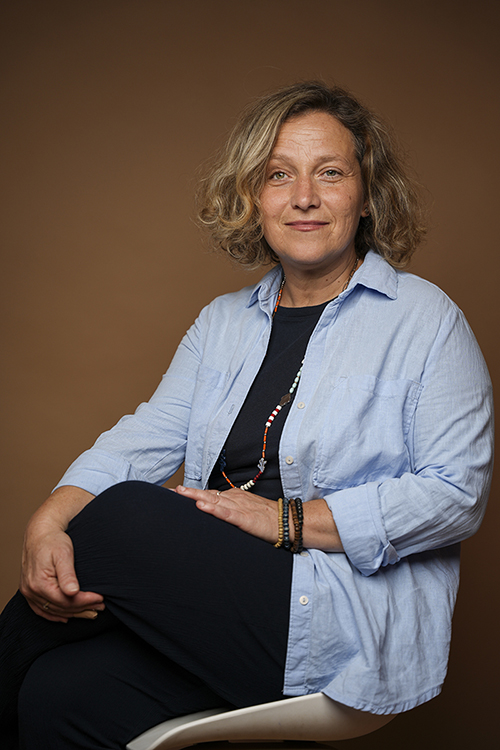This interview was organised by Human Rights House Banja Luka for the third edition of the “Portraits of Strength” photo exhibition. The photo was taken by Tajana Dedić Starović, in studio, Banja Luka, Bosnia and Herzegovina, August 2024.
When did you realise you were a human rights defender?
“[I realised that I am a human rights defender] relatively recently. First, I was a journalist, then an activist, feminist, and media and gender analyst. Then I realised that the term ‘human rights defender’ actually encompasses all these different identities of mine.”
What is the nature of your work and what challenges do you face as a Woman Human Rights Defender?
“The nature of work at Helsinki Citizens’ Assembly Banja Luka is such that you do all sorts of things and that you do it every day, from the organisation of street actions, workshops and conferences to monitoring, reporting and meetings with relevant stakeholders.”
The challenges in this work are varied, from being ignored by decision-makers to being labelled as a foreign agent working against your own people. This, which undermines both the organisation’s and your personal credibility, to the fear of being detained by the police or targeted by nationalist and conservative ideologues.
“Once, my daughter asked me not to attend a parent-teacher meeting at her school. When I asked her ‘Why?’ she replied: ‘Well, who knows what you might say to them, and then I might have problems.’”
“The negative image of NGOs that has been cultivated for years by those in power in Bosnia and Herzegovina, especially in Republika Srpska, is reflected in various areas, including personal, family, educational, business and socio-political aspects. All in all, the environment in which I live and work remains deeply ethnically divided, with nationalist narratives pervasive, not to mention that [the society is] homophobic and xenophobic.”
What is the current situation with human rights in your country?
The environment in which civil society activists in Bosnia and Herzegovina operate can be described as uninspiring and intimidating.
“They receive little public support for their work, and violence against them often goes unpunished, sometimes even encouraged and instigated by government officials. The legal framework within which they operate is fragmented, leading to unequal rights and access to resources.”
“There is little trust that the institutions responsible for protection will respond adequately, and there is a general fear that publicly expressed views or opinions might harm HRDs, their organisations, or their families.”
What kind of human rights situation in your country would you like to see in the next 30 years?
“Everything opposite to what I mentioned before. I would like the laws to be the same for everyone – equally applicable to all, for people to feel safe and be free to express their opinions publicly, for politics to be a skill of governance rather than a tool for enrichment and division, for war-mongering narratives to be replaced by peaceful ones, for us to choose where to go for a concert, dance, or vacation instead of choosing which country to escape to from here, etc.”
Can you describe your motivation to be a human rights defender?
“My motivation lies in wanting to show that it is possible to raise our voices and fight for the rights that belong to us, in wanting to be an example to my children of the values and principles worth fighting for, and in believing that through our own example and behaviour, we can inspire and encourage others to engage in the fight for human rights and freedoms.”
Injustice deeply pains and affects me. I cry watching commercials, so of course, I will cry over the fates of the people around me who are crushed, suffocated, and left unsupported by the system.
“I think this is something I have always had within me, instilled by both my parents and the system I grew up in, which nurtured values like solidarity, responsibility, and work.”
“My entry into the world of activism began with women, with raising awareness of their subordinate position and fighting for their rights. It was driven by the desire to ensure that the rights that our grandmothers, great-grandmothers, and mothers fought for are not diminished or completely taken away.”

About Portraits of Strength
Women human rights defenders (WHRDs) work to protect and advance freedoms while facing discrimination and stereotypes about their role and participation in society.
HRHF seeks to honour and promote independent women human rights defenders and their work through the “Portraits of Strength: Women Defending Human Rights” photo exhibition and highlight the human rights situation in the countries of the Network of Human Rights Houses.
The exhibition, now in its third edition, shares portraits and stories from WHRDs working on a variety of issues including the documentation of human rights violations and alleged war crimes, rule of law, women’s rights, political prisoners, freedom of expression, and more.
Find out more here.





